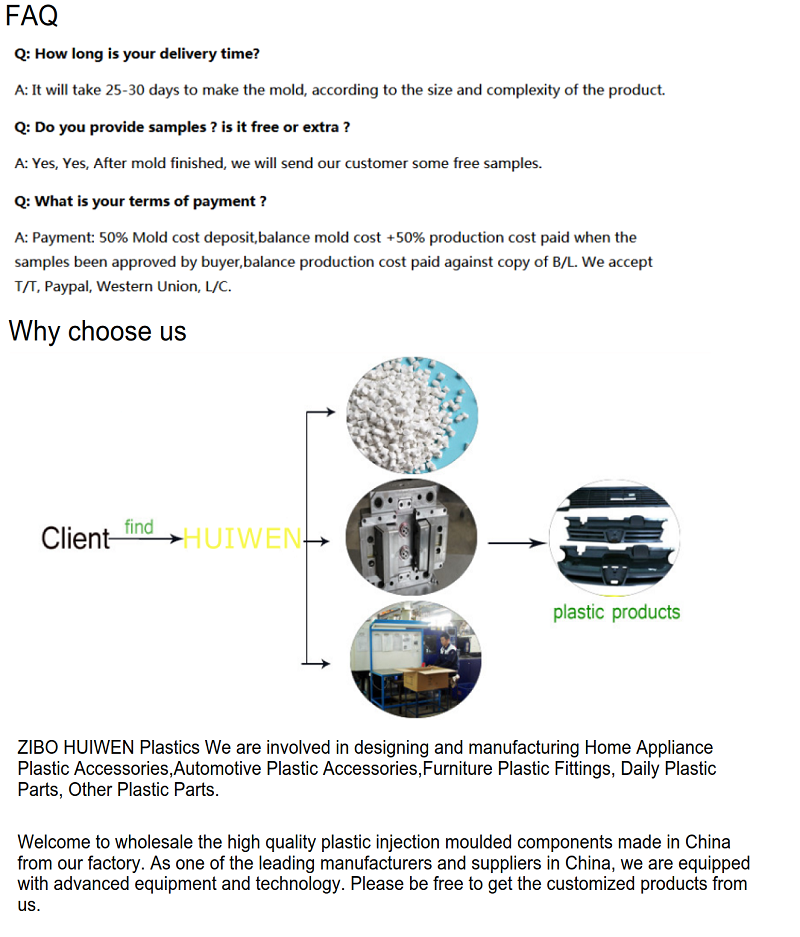Plastic injection molding parts with professional custom offer an affordable and flexible solution for manufacturers in need of high-quality, precision-engineered parts. The parts are designed to specific application requirements, ensuring optimum performance, durability, and aesthetics. With simple to intricate geometries, Plastic injection molded parts can be designed to suit the requirements of different industries and applications. Through the use of advanced manufacturing procedures and experienced engineering teams, these Custom plastic parts provide good repeat quality, reduced lead times, and enhanced manufacturing efficiency.
The key features of expert custom plastic injection molding parts are high dimensional precision, good surface finish, and large volume production with minimal variation. High-quality thermoplastic engineering plastics are employed to ensure that the final products have impact, heat, and chemical resistance. Moreover, these parts can be manufactured in various colors, textures, and finishes to suit brand needs or functional necessities. Customization involves close collaboration among designers, engineers, and manufacturers with a view to ensuring that every element is made to satisfy the intended function of the product.
For custom plastic injection parts, the process begins with extensive design consultations and material selection. Engineers work in direct partnership with customers to discover their individual requirements, such as mechanical properties, end-use environment, and budget. This partnership allows for prototyping and sample part creation before production. This results in a product that not only meets technical specifications but also enhances overall function and user experience. The flexibility of plastic injection molding makes it an ideal choice for small-batch and large-scale production runs.
The detailed description of plastic injection molded components highlights their widespread usage across different industries, including automotive, medical, consumer electronics, industrial equipment, and others. The parts are often utilized in structural assemblies, housing components, connectors, and internal mechanisms where precision and reliability are essential. The ability to incorporate features such as threads, ribs, and undercuts while molding itself adds to the range of designing even further. Furthermore, the use of recycled or biodegradable materials is also becoming more common, reflecting an increased commitment to green production processes.
Plastic injection molding parts professional custom use excels particularly in applications where consistency, repeatability, and cost-effectiveness are most important. For instance, in the automotive industry, they are used in interior and exterior trim, electrical housings, and functional brackets. In the medical field, they are used in diagnostic equipment, surgical instruments, and disposable devices, where sterility and precision are paramount. In consumer electronics, bespoke injection-molded parts assist in forming the slim and durable shape of items such as smartphones, remote controls, and domestic appliances. The flexibility of this manufacturing process ensures it remains a leading choice for diverse applications worldwide.
Plastic injection parts custom reviews by customers always refer to the advantages of customized service, quality, and timely delivery. Many customers appreciate the potential for receiving expert consultation at the design and manufacturing phases to prevent costly errors and rework. The openness of the process, from concept to final inspection, promotes trust and verifies that the final product is exactly as expected. Further, the capability to scale up or down according to demand offers a type of flexibility that is hard to find in other forms of manufacturing. Overall, clients report satisfaction levels that are high due to the combination of technical expertise, attention to detail, and commitment to customer satisfaction.
Frequently asked questions about plastic injection molded components often border on material selection, mold design, and lead times. Clients will probably ask about the best materials for their specific application, considering factors such as strength, weight, and resistance to heat. There are some who inquire about mold complexity and how it affects part performance in the finished product. Production lead times vary according to project size and complexity, but most producers strive to maintain lean schedules without compromising quality. Finishing, assembly, and packaging are post-production operations that some users also inquire about. These issues need to be addressed through good communication and technical knowledge to create long-term client relationships.











